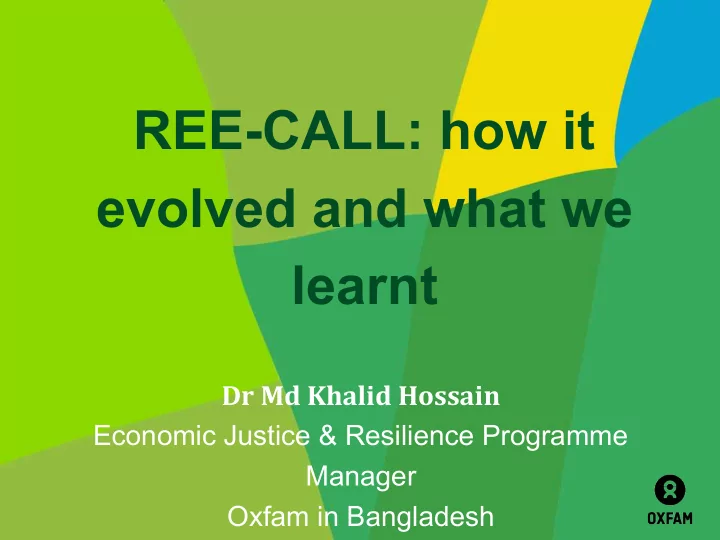

REE-CALL: how it evolved and what we learnt Dr Md Khalid Hossain Economic Justice & Resilience Programme Manager Oxfam in Bangladesh
REE-CALL: Background • Resilience through Economic Empowerment, Climate Change Adaptation, Leadership and Learning (REE-CALL) • Co-creation over a period of 1 year (2009-2010) • First phase - 7 years (Jul’10 -Jun’17; pilot in first 2 years) • Locations: poor, climate vulnerable, hard-to-reach areas – 14 districts in Char, Haor (wetland) & Coastal areas of Bangladesh
Income generating REE-CALL Framework activities Rights in family, society & Economic Reducing state Empowermen disaster risks, t (through Knowledg Adapting to community e climate based Women change Leadership organizations impacts – CBO) Rights and CCA, DRR Entitlements
Most 1 Significant changes Active Citizenship and Knowledge Management
REE-CALL outcomes after 7 years • Notable change in women economic empowerment in terms of increased income; women are not yet influential market actor • Significant evidence of women leadership; in some cases transformative leadership, but not well distributed • Significant evidence of learning as well as claim for rights and entitlements at local level; national level evidence is not prominent • DRR works in terms of awareness building is evident; weak evidence of climate change adaptation for slow onset events
livelihood capitals after 7 years • Highest contribution is in building human and social capitals • Notably contributed in building financial capital which leads to building physical capital; however, not yet at the optimum level • Has not contributed much in building natural capital or improving ecosystem services like land conservation, water conservation, air quality improvement etc.
resilience capacities after 7 years • Mostly contributed in building absorptive and adaptive capacities by tackling known shocks and stresses as well as preparing for unknown shocks and stresses • Could not contribute much in building transformative capacities as root causes of vulnerability, inequality and injustice have not been changed significantly • Some evidences of transformative capacity at local level but not much at national level
How change happens • REE-CALL triggered the most significant changes in most of the cases • Indispensable & inseparable actors and factors behind the changes (e.g., government programs & business expansion of PS) • Value addition to different actors and factors has expedited sustainable change process
Learning for Community resilience building • Economic concerns have got more priority than ecological concerns in building resilience - contextual • Family and community level transformations have just started after 7 years of implementation (e.g., women not yet an influential market actor) - long-term • National policy level transformation would take much more time through continuous influencing - process- oriented • Targeted actions needed to ensure uniform community resilience building (e.g., men are left-out, leadership not distributed) – inclusive • Achievements are higher when different actors add value and factors play positive roles – leveraging
REECALL 2021
REECALL 2021: Knowledge-based citizen actions led by advanced CBOs working with diverse partners Thank You E-mail: mkhossain@oxfam.org.uk
Recommend
More recommend